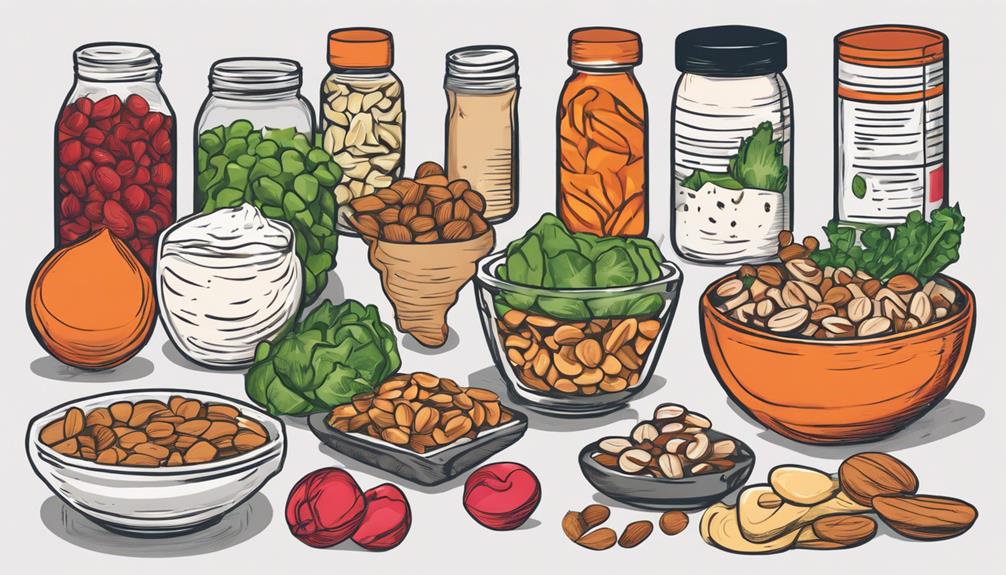Imagine your body as a car engine that needs the right fuel to function efficiently. Just like a car performs better with premium gas, your body operates best with a balanced diet tailored to manage diabetes.
But with so much information out there, navigating the world of diabetic-friendly eating can be overwhelming. However, fret not, for we are here to guide you through the maze of dietary advice to help you make informed choices that will support your health journey.
Key Takeaways
- Consistent meal timing is vital for stable blood sugar control.
- Carb counting and portion control are crucial for managing diabetes.
- Incorporating fiber-rich foods helps stabilize blood glucose levels.
- Opt for healthy snacks to maintain blood sugar stability between meals.
Importance of Meal Timing

For diabetics, understanding the importance of meal timing can significantly impact blood sugar control and overall health. Proper meal timing plays a crucial role in managing blood sugar levels and insulin responses. When you eat can be just as important as what you eat. Eating at consistent times each day helps regulate your body's internal clock, which in turn can help stabilize blood sugar levels and insulin production.
Research has shown that spacing meals evenly throughout the day can prevent drastic fluctuations in blood sugar levels. This approach helps maintain steady insulin levels, reducing the risk of sudden spikes or drops in blood sugar. Skipping meals or eating erratically can lead to imbalances in blood sugar and insulin, making it harder to manage diabetes effectively.
Carb Counting Techniques
Understanding how to effectively count carbs is essential for diabetics in managing their blood sugar levels and overall health. Here are some practical tips to help you master carb counting:
- Consider the Glycemic Index: Focus on carbohydrates with a low glycemic index to help stabilize blood sugar levels. Foods like whole grains, legumes, and non-starchy vegetables are good choices.
- Portion Control: Pay attention to portion sizes as different foods contain varying amounts of carbohydrates. Use measuring cups or a food scale to accurately track your carb intake.
- Read Food Labels: Check nutrition labels for total carbohydrates per serving. Be mindful of hidden sugars or carbs in processed foods.
- Factor in Insulin Management: Consult with a healthcare provider or a dietitian to align your carb intake with your insulin regimen. Balancing carbs with insulin doses is crucial for blood sugar control.
Incorporating Fiber-Rich Foods

Incorporate fiber-rich foods into your diet to help manage blood sugar levels and improve overall health as a diabetic. Fiber slows down the absorption of sugar, preventing rapid spikes in blood glucose levels. Opt for whole grains like quinoa, brown rice, and oats, as well as fruits, vegetables, legumes, and nuts. These foods not only provide essential nutrients but also contribute to better blood sugar control.
If you struggle to meet your daily fiber intake through whole foods alone, consider incorporating fiber supplements. Psyllium husk, for example, is a soluble fiber that can help regulate blood sugar fluctuations. When choosing a fiber supplement, opt for one without added sugars or artificial ingredients.
Incorporating fiber-rich foods in your meals can also aid in weight management and promote satiety, reducing the risk of overeating. Aim to gradually increase your fiber intake to avoid digestive discomfort and stay well-hydrated throughout the day. By focusing on fiber-rich choices, you can better manage your blood sugar levels and support your overall well-being as a diabetic.
Portion Control Tips
To better manage your blood sugar levels, focus on controlling your portion sizes when planning your meals as a diabetic. Eating habits play a crucial role in weight management and overall health. Here are four practical tips to help you with portion control:
- Use Smaller Plates: Opt for smaller plates to trick your mind into thinking you're eating more. This can help you control your portions without feeling deprived.
- Practice Mindful Eating: Slow down and pay attention to your food. Enjoy each bite, savor the flavors, and stop eating when you feel satisfied. This can prevent overeating.
- Measure Portions: Be mindful of serving sizes by using measuring cups or a food scale. This can help you understand how much you're eating and make adjustments as needed.
- Pre-Portion Snacks: Instead of eating straight from a large bag or container, pre-portion snacks into smaller containers or bags. This can prevent mindless eating and help you stick to appropriate portions.
Healthy Snack Options

For diabetics looking for nutritious options to satisfy hunger between meals, consider incorporating healthy snack choices that support your blood sugar management goals. Opt for nutrient-dense choices like raw veggies with hummus, Greek yogurt with berries, or a handful of nuts. These snacks provide a good balance of carbohydrates, protein, and healthy fats to keep your blood sugar levels stable. Tasty alternatives such as apple slices with almond butter or air-popped popcorn sprinkled with cinnamon can also satisfy your cravings without causing sharp spikes in blood sugar.
When it comes to healthy snacking, easy prep options are key for convenience. Pre-cut vegetables, hard-boiled eggs, or pre-portioned cheese sticks are great choices that require minimal preparation. Additionally, opting for guilt-free indulgences like dark chocolate squares or homemade trail mix with nuts and seeds can add variety to your snack routine while still being mindful of your blood sugar levels. By choosing these smart snack options, you can keep your hunger at bay and maintain better control over your diabetes management.
Frequently Asked Questions
How Can Stress and Sleep Patterns Affect Blood Sugar Levels in Diabetics?
To manage stress and improve sleep for better blood sugar control in diabetics, prioritize stress management techniques and establish good sleep hygiene. Consistent efforts in these areas can positively impact blood sugar levels and emotional well-being.
Are There Any Specific Types of Exercise That Are Recommended for Diabetics to Help Manage Their Condition?
Feeling unsure about which exercises suit you best for managing diabetes? Aerobic workouts, strength training, interval sessions, and flexibility exercises can all benefit your health. Mix it up to keep your body strong and balanced.
What Are Some Common Myths About Diabetes and Diet That Diabetics Should Be Aware Of?
When managing diabetes, debunking myths is vital. Be wary of misconceptions that may lead to unnecessary dietary restrictions. Stay informed, consult healthcare providers, and focus on balanced eating habits rather than falling prey to common misconceptions about diabetes and diet.
How Can Social Environments and Peer Pressure Impact a Diabetic's Ability to Stick to a Healthy Diet Plan?
In social environments, peer pressure can influence your food choices and temptations. Remember, social support is crucial for motivation. Surround yourself with people who respect your dietary needs and goals, making it easier to stick to a healthy diet plan.
Are There Any Specific Vitamins or Supplements That Are Recommended for Diabetics to Support Their Overall Health and Well-Being?
To support overall health and well-being, consider nutritional supplements like vitamin D and magnesium. These can aid in blood sugar control and complement dietary restrictions. Consult with your healthcare provider for personalized advice on meal planning.
Conclusion
In conclusion, managing diabetes requires a balanced approach to eating.
Just as a well-tuned orchestra combines different instruments to create harmony, combining meal timing, carb counting, fiber-rich foods, portion control, and healthy snacks can help diabetics maintain stable blood sugar levels.
By following these diet strategies, individuals can take control of their health and live a fulfilling life full of vitality and energy.
Just like a well-conducted symphony, a well-balanced diet can create harmony in your body.